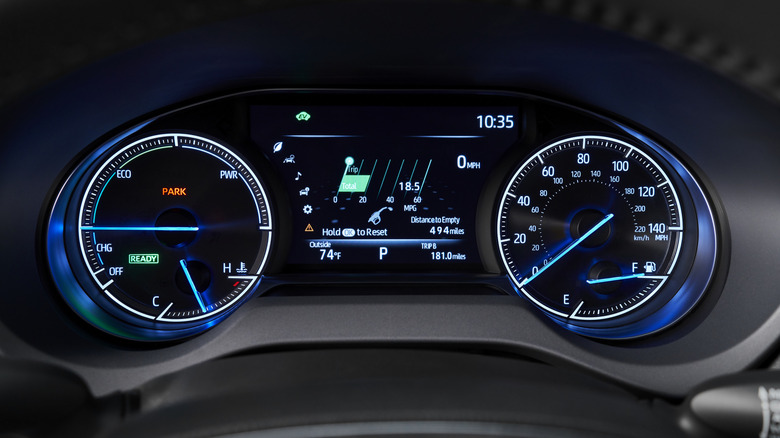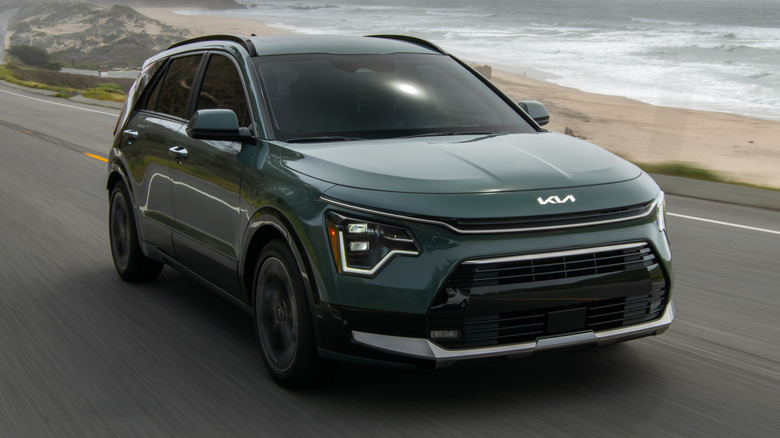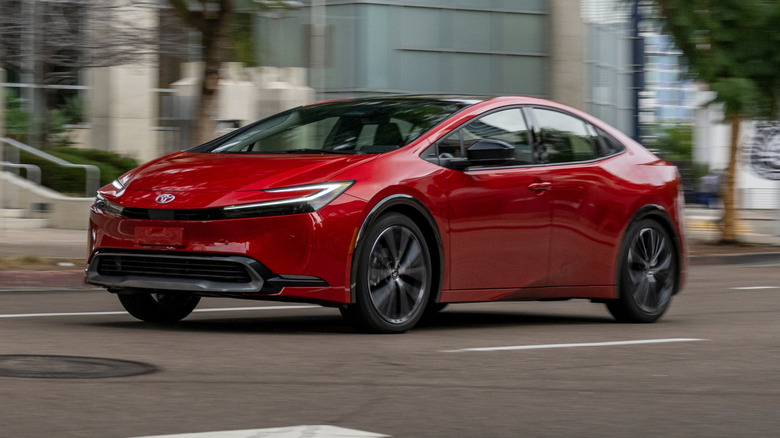MPG: What It Means, And Why You Shouldn't Obsess Over The Number
When shopping for a car, it's common to hear the word mpg bandied about, as it is a crucial consideration for buyers who want to save money by keeping running costs as low as possible. But what exactly does the term mean? MPG is an acronym that stands for miles per gallon. It is the most commonly used fuel efficiency measure in the U.S., and often indicates how far a vehicle can travel on one gallon of fuel. For example, a car that's rated to return 20 mpg will travel 20 miles on a single gallon of fuel. Usually, the higher the mpg figure, the better the economy, and the more money you save on fuel costs.
But just what figure makes a good mpg for your car? Is it 30, 40, or even 60 mpg? The truth is, there's no one perfect measure for all cars. It varies depending on factors such as the engine size and class of car you're looking at. In general, the bigger the vehicle, the more fuel it needs to get going, since big, heavy cars usually ship with bigger or more powerful engines than smaller ones.
According to Autolist, anything above 13 mpg stands as a good mpg for a large SUV, while for smaller SUVs and crossovers, a combined city-highway fuel economy rating of at least 16 mpg is generally considered good. For trucks, Autolist quotes 12 mpg and above as a good fuel consumption figure, depending on truck size. If you're considering a luxury car, anything over 14 mpg is said to be good, while gas-engined compact cars and hybrid models must earn no less than 21 and 35 mpg, respectively, to be deemed as having good fuel economy.
What factors affect a car's fuel economy?
Getting good fuel economy out of a car depends on a lot more than engine size and car mass alone. Driving conditions are also a big factor in how much fuel your car will use. Cars that are mostly driven on highways use less fuel on average and usually have a better fuel consumption figure than similar models that drive primarily in the city where there's frequent stop and start traffic. Aggressive driving habits, such as sudden acceleration and hard braking can also increase your car's fuel consumption, so it's generally recommended to brake gradually, maintain a steady speed, and avoid accelerating harshly if you're looking to achieve good mpg numbers.
The amount of load your car is carrying can also impact its fuel economy. According to the Department of Energy, every 100 pounds of weight in your car can reduce its fuel economy by roughly 2 mpg. Additionally, the Department says you can save fuel and cut cost by up to $0.11 per gallon if you keep your tires properly inflated, as doing so reduces rolling resistance — the force required to move the tire — and consequently improves fuel efficiency. Limiting idling time and performing regular maintenance and servicing can also important aspects that can affect how many miles your car can travel per gallon.
Cars with the best mpg in each segment
The EPA has compiled a comprehensive list of the most fuel efficient cars in each class. The Toyota Prius is the gasoline car with the best mpg overall, providing around 57mpg to top the midsize class. A Honda duo, the Civic and Accord Hybrid, both lead the large car segment with an official combined fuel economy figure of 48mpg, while Toyota takes the compact car category for the second time thanks to the Corolla Hybrid's 47mpg.
The Toyota Crown Signia, with an average fuel economy of 38mpg, is listed by the EPA as the most economical small station wagon, whereas the midsize station wagon class is topped by a European trio of the Audi A6 Allroad, Volvo V90, and Mercedes-Benz E450 4MATIC wagon, all getting 25mpg. BMW-owned brand MINI holds sway in the subcompact segment, with the MINI Cooper Convertible, Cooper S Convertible, and MINI JCW Convertible all achieving 30mpg.
The British automaker also dominates the minicompact segment thanks to the MINI Cooper Hardtop 2 door and MINI Cooper S Hardtop 2 door, which both average 32mpg in combined use. If, however, you want a two-seater sports car, the Mazda MX-5 is the one with the best economy, averaging 29mpg for both automatic and manual-equipped models.
In regard to SUVs, the generously-equipped Kia Niro is the best model for fuel economy, with an average return of 53mpg. The Toyota Grand Highlander Hybrid, meanwhile, is the most efficient standard SUV at 36mpg. That's the same average return as the Toyota Sienna, which ranks as the minivan with the best mpg. As for trucks, the small Ford Maverick HEV has the most mpg at 38, while the Chevrolet Silverado and GMC Sierra both top the standard pickup class with 26mpg.


